Announcing the Inaugural Scholars and Mentors of the Towards 2044: Horowitz Early Career Scholar Program
SRCD is pleased to announce the first cohort of scholars and mentors selected as part of the Towards 2044: Horowitz Early Career Scholar Program. Previously known as the Frances Degen Horowitz Millennium Scholars Program, the new iteration of this mentorship opportunity takes its name from the year when the adult population of the United States is estimated to become a diverse majority.
The Towards 2044: Horowitz Early Career Scholar Program will provide educational and professional development for scholars from underrepresented groups, giving them a launching point for a career in the field of child development with the guidance and mentorship from more advanced scholars. The selected scholars and mentors will pair up and participate in a series of monthly seminars and one-on-one meetings through December 2021. These experiences will enable the rising scholars to gain valuable exposure to the field and allow them to network not only with their mentors, but also with other scholars and professionals.
The 2021 cohort was chosen from a strong pool of applicants by the program’s advisory committee, which is chaired by Dr. Michael Cunningham (Tulane University) and includes Dr. Mayra Bámaca (University of California, Merced) and Dr. Charissa Cheah (University of Maryland, Baltimore County).
2021 Horowitz Program Scholars

Ana Katrina (Anika) Aquino, University of Maryland, Baltimore County
Ana Katrina (Anika) Aquino, M.A. is a doctoral student from the University of Maryland, Baltimore County’s Applied Developmental Psychology Program. Her research interests are in early childhood care and education, specifically among immigrant families and families of color. Anika wants to conduct research on processes unique to these populations, such as acculturation, enculturation, racial-ethnic socialization, and biculturalism. These processes specifically occur within families’ interactions with a dominant culture, which may include adverse experiences of racism, prejudice, xenophobia, and discrimination. As a researcher, Anika wants to support families who are vulnerable to such experiences, especially the parents that must navigate these contexts for themselves and their children. As a graduate student, Anika works as a Center Specialist for UMBC’s Home Visiting Training Center, supporting the professional development of home visitors, specifically on the topics of parenting and cultural sensitivity. She is also a research assistant for the Sherman Center for Early Learning in Urban Communities, doing evaluative work of culturally responsive programs in school settings. Her master’s thesis analyzed qualitative data to understand the motivations, needs, and experiences of Latinx immigrant child care providers. Finally, Anika also interns for APA’s RESilience Initiative, supporting the development of resources for parents to talk with their children about race.

Anissa Eddie, Michigan State University
Anissa Eddie is an early childhood researcher and consultant. Anissa’s background is in social work and she has worked as a school-based social worker, an outpatient therapist, and a college instructor. Prior to starting her doctoral program, Anissa led the PN-3 initiative in Kent County, Michigan as a Pritzker Fellow. She is currently pursuing a Ph.D. in child development at Michigan State University under the advisement of Dr. Claire Vallotton. Anissa is interested in leveraging research to inform public policy in order to increase equitable outcomes for young children and families – particularly within the contexts of birth justice, ethnic-racial socialization, and social determinants of health. Anissa is also the founder and Principal Consultant of Liminality Consulting. Through her consulting practice, Anissa works with local, state, and national collaboratives to develop equity centered initiatives and strengthen early childhood systems. Grounded in sociocultural theory, identity development theory, and critical race theory, Anissa’s research and practice aims to inform families, early childhood educators, and policymakers as they invest in infants and toddlers and build systems that enable all children to thrive. Anissa lives in Grand Rapids, Michigan with her partner and their three children.
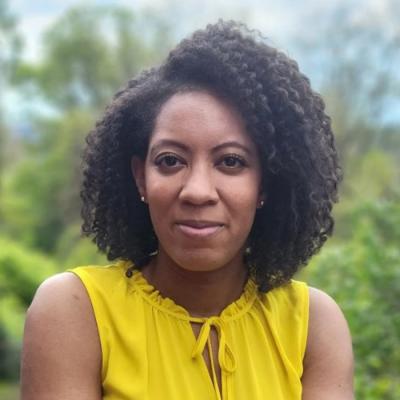
Daniesha Hunter, University of Pittsburgh
Daniesha Hunter, M.S., is a Developmental Psychology graduate student at the University of Pittsburgh. Ms. Hunter received her master’s degree in Counseling Psychology from Chatham University and completed her undergraduate degree at Villanova University. Prior to pursing a doctoral degree in developmental psychology, Ms. Hunter worked on research studies related to health disparities, substance use, and ADHD. Her prior experience also includes clinical work in outpatient programs and integrative therapy via school-based care. Ms. Hunter is broadly interested in exploring resilience factors of adolescents that relate to long-term well-being. She has a particular interest in understanding youth experiences and perceptions of their interpersonal relationships, environment, and contexts on well-being outcomes (e.g., academic, psychosocial functioning). Her current research project centers around youth perceptions of family hardship and youth perceptions of home environment on well-being.
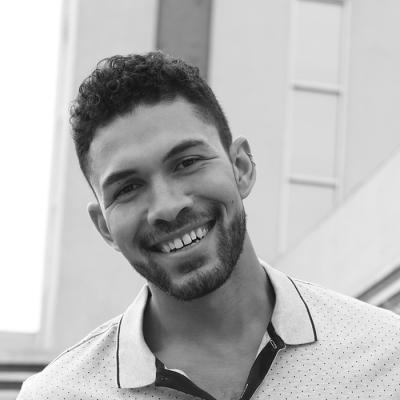
Steven Kasparek, Harvard University
Steven is a second-year clinical science Ph.D. student at Harvard University. Born and raised in Ferguson, Missouri, Steven is a first-generation college graduate. As a multiracial person born to a Black father and a White mother, Steven’s experience of race has been and continues to be complex but enlightening. He additionally identifies as gender-fluid and queer and finds hope in building and being a part of these communities. Though he does not want to be defined solely by his background and identities, Steven highlights these parts of himself to signal to others who are underrepresented and minoritized in these spaces that they can show up as their full selves. Steven's research interests have converged on questions related to neuro-developmental and behavioral mechanisms underlying cycles of violence: namely, associations of childhood violence exposure and the development of impulsivity and other-directed aggression and violence in adolescence and young adulthood. He is particularly interested in how aberrations in reward processing may contribute to these associations. Further, Steven is interested in bridging neuro-developmental, clinical, and social psychology to better understand how violence-exposed youth manifest social information processing biases, such as intergroup bias, and how these biases inform psychopathology.
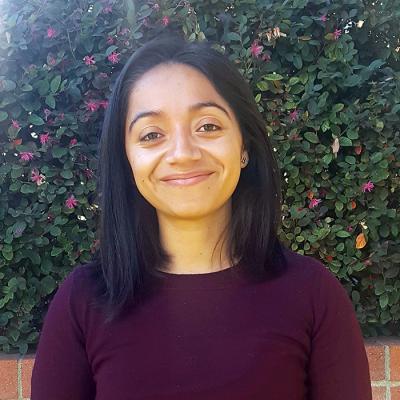
Angelina Majeno, University of California, Irvine
Angelina Majeno is a second-year Psychological Science Ph.D. student at the University of California, Irvine. Her research focuses on social marginality and its effects on health. Specifically, she investigates how sociocultural stressors, such as discrimination, impact health outcomes through the dysregulation of biobehavioral and physiological systems (e.g., sleep, cardiovascular reactivity) in ethnic minority youth and emerging adults. Her current research approaches discrimination as a multidimensional phenomenon, utilizing a comprehensive view of different forms of discrimination concurrently (e.g., interpersonal, institutional), in addition to examining how individuals react to and cope with discrimination. She holds a Master of Public Health and Bachelor of Arts degrees in Psychology and Human Development from California State University, Long Beach.
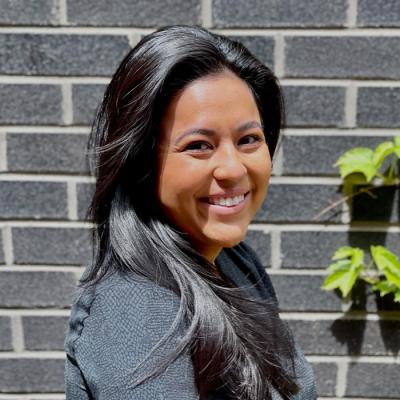
Sasha Mejia-Bradford, University of Pennsylvania
Sasha is a Latina scholar born and raised in southern California to Salvadoran parents. She received her bachelor’s degree from the University of California, Santa Barbara in History, Education, and Applied Psychology. Upon graduation, she worked as a high school educator for six years in Eastern New Mexico. During this time, she earned her first M.Ed. in Secondary Education from Eastern New Mexico University, and a second M.A. in Program Evaluation and Improvement Research from the University of Michigan. In 2019, she joined the research and evaluation team at the University of Michigan—ADVANCE—where she conducted climate assessments, analyzed institutional data, and produced evaluation reports centered around equity and inclusion. Sasha holds experience in both quantitative and qualitative research methods and has been published in the Journal of Cognitive Psychology. She is currently pursuing her doctoral degree at the University of Pennsylvania, Graduate School of Education, in the interdisciplinary studies in human development program. Her research interests focus on the racial socialization of Latinx adolescents, how they form perceptions of intellect, and the effects of racial literacy on their development. Sasha is excited to become the first Dr. Mejia-Bradford in her family.
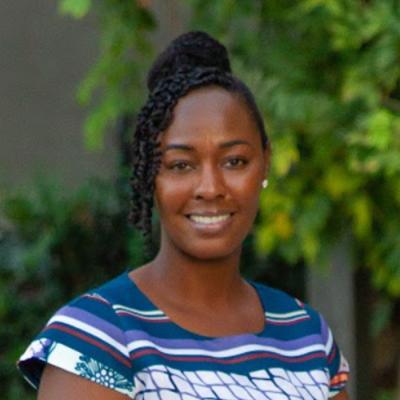
Jamaica Murphy, Harvard University
Jamaica earned a bachelor’s degree from the University of California, Berkeley in Social Welfare and Ethnic Studies, a master’s degree in Social Work from the University of Southern California (USC), and a master’s degree in Education from the University of California, Los Angeles, (UCLA). Currently, Jamaica is a Ph.D. student at Harvard Graduate School of Education studying how adversity impacts brain development and skills acquisition. She is the recipient of Harvard’s highest merit-based award, the Presidential Scholarship. Prior to starting her Ph.D. program, Jamaica most recently served as a district-wide Mental Health Specialist, overseeing and managing the district's comprehensive mental health program. In this role, she supervised therapists, oversaw the counseling referral process, and conducted mental health assessments. She also provided training for school staff and parents related to how students' social-emotional functioning impacts their educational experience as well as strategies for supporting students. When Jamaica began this position, there was no mental health program in place; she was tasked with developing a new program, including creating policies, procedures, and protocols. She designed the entire service delivery model, including the creation of a counseling referral system, development of intake and discharge assessments and establishment of a suicide risk assessment procedure.
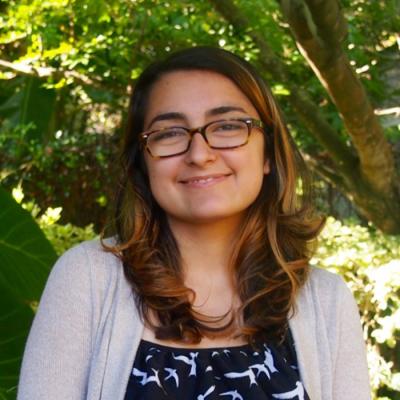
Julia Najm, East Tennessee State University
Julia Najm is a third-year clinical psychology doctoral student. She is a member of the Affect, Regulation Coping and Health (ARCH) lab at East Tennessee State University. Her research interests include understanding the impact of intergenerational transmission of trauma on children’s emotional development and looking through an intersectional lens at the barriers marginalized groups face in accessing behavioral health services in rural regions. Her clinical interests include utilizing brief solution focused behavioral interventions for children and families in primary care clinics. In her free time, she enjoys spending time with her cat, friends, family, and partner, cooking, reading, and watching mystery/thriller shows.

Taina Quiles, University of Virginia
Taina B. Quiles graduated from Fordham University in 2014, with a Bachelor of Science in Psychology. As an undergraduate, she engaged in developmental and youth participatory action research to better understand marginalized youths' academic experiences and responses to discrimination at their schools. Later, she participated in the Coro Fellowship in Public Affairs in Pittsburgh to influence community initiated social change. Now, Taina is a doctoral student at the University of Virginia studying Community Psychology, and works with Dr. Seanna Leath. Quiles’ research prioritizes racial healing work by illuminating the resistance that Black and Latinx adolescents demonstrate in the face of oppression. She is specifically interested in how these youth leverage ethnic-racial identity, critical consciousness, and sociopolitical development to navigate inequities in educational contexts. Outside of her academic research, Taina is learning more about racial healing through herbalism and doula work.

Tseng Vang, University of California, Davis
Tseng Vang is a Hmong American born to Hmong refugee parents and raised in Sacramento, CA. He completed his bachelor’s at the University of California, Merced and a master’s at California State University, Sacramento. Tseng is currently a third year Ph.D. student in Human Development at the University of California, Davis, under the mentorship of Drs. Adrienne Nishina and Kevin Gee. Tseng’s research can be summed up with two words: inclusion and diversity. He is interested in understanding how schools can create inclusive environments that foster school belonging. He is also interested in understanding outcomes associated with experiences with diversity (e.g., cross-ethnic peer interactions). Besides research, Tseng spends most of his free time watching movies. Tseng tends to enjoy coming-of-age movies such as Stand by Me and The Sandlot.

Daniel Ewon Choe, University of California, Davis
Daniel Ewon Choe is a developmental psychologist (2012 Ph.D. in Psychology, University of Michigan) and Assistant Professor of Human Development and Family Studies at University of California, Davis. He grew up in northern California in a suburb of San Francisco, and completed his undergraduate education at San Diego State University (2007 B.A. in Psychology). Dr. Choe’s research interests focus on the development of children’s self-regulation and externalizing behavior problems (e.g., aggression), their complex associations with parents’ mental health and caregiving, and their contributions to the onset of psychopathology, specifically child conduct problems and maternal depressive symptoms. He follows a biopsychosocial approach to studying psychopathology and its intergenerational transmission with observational, questionnaire, neuropsychological, behavioral, and biological data. Dr. Choe’s lab is currently examining parents’ and young children’s executive functions, psychophysiological markers of stress and regulation, as well as family and screen media influences on the development of problem behaviors.

Michelle Desir, Pennsylvania State University
Michelle Desir, Ph.D., is a Postdoctoral Fellow in Child Abuse Pediatrics at Penn State Hershey Medical Center. Beginning in August 2022, she will be an Assistant Professor in the Department of Psychology at University of South Carolina. Dr. Desir received her Ph.D. in Child Psychology from the University of Minnesota in 2019 where she completed a joint training program in Developmental Psychopathology and Clinical Science. Her research focuses on delineating risk and protective factors that influence the developmental trajectory of maltreated children. As a Ph.D. student, she secured a National Science Foundation Graduate Research Fellowship to investigate how interpersonal experiences alter developmental pathways from childhood victimization to adverse outcomes. As a postdoctoral fellow, her research is focused on the influence of maltreated children’s friendships on subsequent developmental outcomes and factors that influence treatment outcomes for maltreated children receiving evidence-based interventions. This work has been funded by the National Institute of Child Health and Human Development. Additionally, she provides therapy to maltreated children and families. Dr. Desir is a 2017 SRCD Millennium Scholar, the outgoing SRCD Student and Early Career Council (SECC) Representative to the Program Committee, and an active member of SRCD’s Black Caucus.

Aileen Garcia, South Dakota State University
Aileen S. Garcia is currently an Assistant Professor in the Department of Counseling and Human Development at South Dakota State University (SDSU), USA. She obtained her Ph.D. in Child, Youth and Family Studies from the University of Nebraska-Lincoln (UNL) in 2018. Her research interests include cultural influences on parenting and caregiving, children’s socioemotional development, and quality of life among ethnic minorities and immigrants in the United States. Dr. Garcia’s overarching research agenda is to further extend current knowledge on parenting and child development among underrepresented groups, to reflect parental ethnotheories and practices that may not be captured by the dominant, mostly Western-based literature. Thus far, she has published qualitative and quantitative studies on parenting stress and parental involvement in education among low-income Filipino families, best practices in childcare centers and family childcare homes in urban and rural areas, and childrearing practices of immigrants in the United States from different ethnic groups (e.g., Chinese, Filipino, Indian, Korean, and Mexican). Dr. Garcia also engages in multidisciplinary research projects, working with scholars and practitioners from the fields of human development, psychology, early childhood education, and nutrition and health sciences.

Erika Hernandez, Pennsylvania State University
Erika received her B.A. in Psychology from Baylor University and her M.S. and Ph.D. in Developmental Science at Virginia Tech. She is currently a postdoctoral scholar at Penn State with the Center for Childhood Obesity Research (CCOR). Her graduate research focused on familial socialization of children’s socio-emotional development through conversation, including emotion regulation, emotion understanding, and social competence. She is especially interested in the socio-cultural context of socialization and conducted work with African American, Latinx, and Appalachian families for her dissertation. Erika received a Ford Dissertation Fellowship to conduct this work. During graduate school, Erika also conducted research on family conversations about health decisions and the influences on children’s physical activity, diet, and cardiovascular health. She is building on this work in her postdoctoral position at CCOR by examining familial and biological influences on children’s emotional eating and appetite regulation.
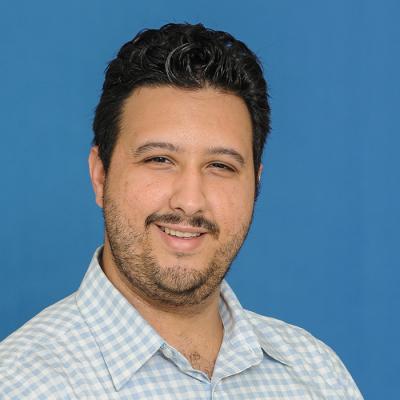
Alan Meca, University of Texas at San Antonio
Alan Meca is currently an Assistant Professor in the Department of Psychology at Old Dominion University (ODU) and will be transitioning to the University of Texas at San Antonio in Fall 2020. He received his Ph.D. in Developmental Science from Florida International University in 2014 and completed a postdoctoral fellowship at the University of Miami. Broadly, his expertise is in identity development, acculturation, cultural stress, longitudinal methods, and positive youth development. Although his research has focused broadly on identity development, most of his work has been on cultural identity development and acculturation among ethnic/racial minority youth, particularly within Hispanic/Latinx populations. Towards this end, his research agenda has focused on identity development and cultural stressors and their effects on health risk behaviors, mental health, and educational achievement. In pursuit of this research agenda, he has published over 60 peer-reviewed manuscripts focused on personal, ethnic/racial, and national identity and on the cultural dynamics among Latinx families. Currently, his research agenda is focused on refining measures of cultural identity, understanding the processes that govern how ethnic/racial minority navigate their cultural environment (e.g., code-switching, cultural frame switching), and identifying ways we can support youth experiencing cultural stressors such as discrimination, bicultural stress, and negative context of reception.
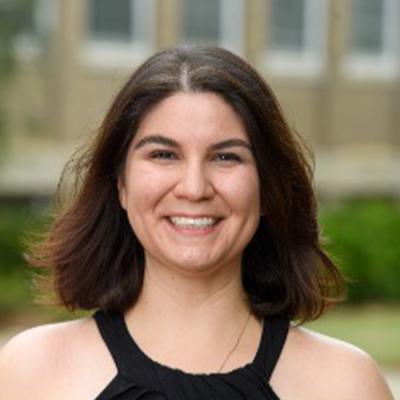
Stephanie Miller, University of Mississippi
Stephanie Miller is an associate professor and Director of Experimental Training in the Psychology Department at the University of Mississippi. She earned her Ph.D. in Developmental Psychology from the University of North Carolina at Greensboro. Dr. Miller’s research program focuses on early cognitive development, with an emphasis on executive function (EF). Her work aims to explore the emergence and development of this foundational cognitive skill within a broader sociocultural context. She has work examining how early communicative and linguistic skills support the emergence of cognitive control across different cultural contexts; how executive function relates to social functioning in friendships, social problem solving, and social cognition; and how EF relates to creative cognition. Her current work is focused on examining foundations of early EF and examining the effectiveness of mindfulness-based interventions on social-emotional development within a preschool curriculum across multiple and diverse contexts. This work has been funded by the Eunice Kennedy Shriver National Institute of Child Health and Human Development (NICHD) and the Kellogg foundation. Dr. Miller has served or reviewed for committees related to diversity, equity, and inclusion for the North Carolina Psychological Association, Association for Psychological Science, the University of Mississippi’s Department of Psychology, and the Society for Indian Psychologists.
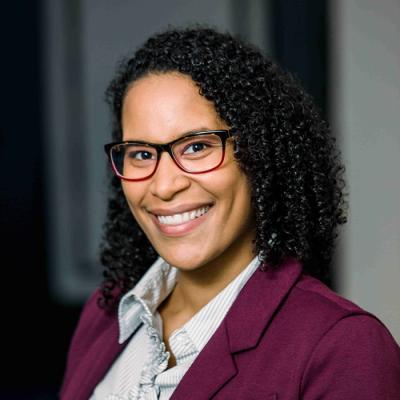
Charisse Pickron, University of Minnesota
Dr. Charisse B Pickron is a postdoctoral research associate at the Institute of Child Development (ICD), University of Minnesota, where she will be joining the faculty as an Assistant Professor beginning September 2021. Dr. Pickron earned her B.A. in psychology from Mount Holyoke College, South Hadley, MA in 2008. In 2010, she completed a 1-year research internship as a Northeast Alliance for Graduate Education & the Professoriate (NEAGEP) fellow at the University of Massachusetts Amherst. During this internship she participated in the Millennium Scholars Program (MSP, 2011) which greatly influenced her decision to pursue child development research. She then completed her M.S. (2015) and Ph.D. (2018) in Developmental Science from the University of Massachusetts Amherst. Dr. Pickron investigates the way early experience shapes infants’ engagement with their social world. Her work sits at an intersection of perceptual and socio-cognitive perspectives as means for examining social information processing in early development, emphasizing questions about race and gender. Dr. Pickron utilizes an interdisciplinary approach that includes behavioral and neurophysiological techniques (i.e., EEG and eye-tracking). Her goal is to conduct research using a diversity science approach, working toward increased representation and engagement with community, participants, research teams, and mentorship.

Sandra Simpkins, University of California, Irvine
Sandra Simpkins is a Professor at the University of California, Irvine (UCI) School of Education in the area of Human Development in Context. She holds a Ph.D. in developmental psychology. Sandra has received several honors including, being a Fellow of the Association of Psychological Science (APS). She has authored over 100 publications and 150 presentations. Her research addresses positive youth developmental processes, the influence of families and organized activities on those processes, and how these processes vary by social position factors (such as, ethnicity and gender). Her current projects focus on how youth’s organized after-school activities support their positive adjustment into adulthood and how families help support adolescents’ STEM motivation, activities, and choices.
Vanessa Volpe, North Carolina State University
Dr. Volpe is an applied developmental health psychologist with a focus on the reduction of racial/ethnic health disparities by employing critical psychological and social justice lenses. Her research aims to explicate the processes by which and the contexts in which individuals resist and protect themselves against forms of individual-, cultural- and structural-level marginalization (e.g., racism, sexism, heterosexism), with specific attention to the preservation of health in Black and Latinx communities. She employs an eclectic set of methodologies to answer research questions about health and oppression, from laboratory-based physiological studies to community-engaged research, encompassing quantitative, qualitative, and mixed methods analytic approaches. She aims to use critical strengths- and community-based contextual approaches to use the knowledge gleaned from research as the springboard for healing programming and policy. Her current line of research focuses on health risks and protections in online and technological contexts, particularly among Black and Latinx emerging adults.

Chenyi Zhang, Georgia State University
Chenyi Zhang’s research projects examine contextual, cognitive, and emotional factors that contribute to children’s early literacy development and early childhood educators’ professional development. He is also an early interventionist designing and evaluating classroom-based literacy intervention programs for young children’s literacy development and professional learning program for educators’ effective teaching practices. He maintains international collaborations with scholars from Asian countries (e.g., China and Japan) investigating cross-cultural differences in early literacy development and literacy teaching. Currently, Zhang is examining the development of young children’s interest in enacting writing behaviors and cultural differences in teachers’ writing instruction (China vs. the U.S.). He is also leading a research team investigating the impact of the COVID-19 pandemic on young children’s and parents’ stress. He is a board member of the Association for Reading and Writing in Asia. He was a National Academy of Education/Spencer Research Foundation Post-doctoral Fellow from 2016 to 2018. Zhang has received a variety of research funding support for his early literacy and intervention research projects, including Spencer Research Foundation, Rollins Center for Language and Literacy and National Hazard Center. Zhang received a Ph.D. in Human Development and Family Studies with a specialization in developmental studies in 2013 from Purdue University and an M.S degree in Human Development and Family Studies from the University of Missouri-Columbia in 2008.